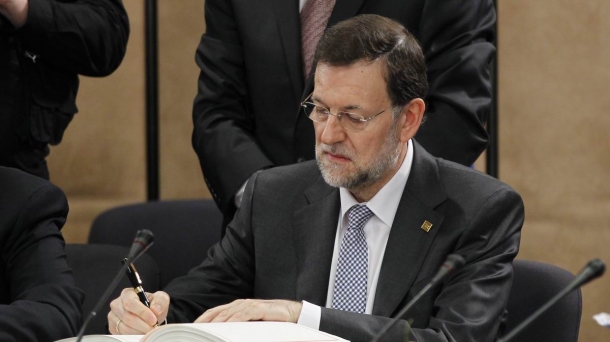news
Spain
Rajoy defies Brussels, sets deficit target at 5.8 percent for 2012
Reuters
Madrid / Brussels
According to Prime Minister Mariano Rajoy, Spain's new 2012 target of 5.8 percent of GDP was more realistic than the original 4.4 percent goal.
-

Spain's Prime Minister Mariano Rajoy. Photo: EFE
Spain set itself a softer budget target for 2012 on Friday than originally agreed under the euro zone's austerity drive, putting a question mark over the credibility of the European Union's new fiscal pact.
Prime Minister Mariano Rajoy insisted he was acting within EU guidelines because the plan was still to hit the European Union public deficit goal of 3 percent of gross domestic product (GDP) in 2013.
Spain's new 2012 target of 5.8 percent of GDP was more realistic than the original 4.4 percent goal but still demanding, he said. "I'm backing austerity and aim to reduce the deficit from 8.5 percent to 5.8 percent; that's significant austerity," he said at the end of an EU summit in Brussels on Friday.
The announcement cast a pall over an agreement for tougher debt rules in the bloc. All but two of the EU's 27 leaders signed up to a 'fiscal compact' on Friday that commits euro zone countries to balancing their budgets over the medium term.
Spain has already cut spending sharply and adopted economic reforms to avoid getting sucked deeper into the crisis that has forced Greece, Ireland and Portugal to seek bailouts.
German Chancellor Angela Merkel and European Council President Herman Van Rompuy said there should be no flexibility on fiscal targets for countries in economic difficulties. "Meeting fiscal consolidation targets in vulnerable countries has been and remains one of the cornerstones of the EU's comprehensive response to the crisis. It is key to reinforce confidence," said Amadeu Altafaj, spokesman for European Commissioner for Economic and Monetary Affairs Olli Rehn.
Rajoy said his move would not spook markets, but Spain's long-term cost of borrowing rose after the news, bringing it to parity with heavy debtor Italy for the first time since August, as investors fretted Madrid may have to sell more debt than planned.
Test case
Spain is emerging as a test case of whether Europe is willing to ease fiscal rules that heap more cuts on member states grappling with stunted growth, high unemployment and the threat of growing social unrest.
The government said on Friday that Spain's economy will shrink 1.7 percent this year, matching an International Monetary Fund forecast. It sees the jobless rate at 24 percent.
Rajoy's decision made economic sense for Spain but Madrid and Brussels should have avoided a clash, said Thomas Klau, head of the European Council on Foreign Relations in Paris. "It's the first step for undermining the credibility of a system which has not even had time to accumulate any credibility capital," Klau said, referring to the fiscal pact.
Rajoy said he did not bother lobbying other European leaders at Friday's summit. "I'm not going to tell the other presidents or heads of state about the deficit figure that will be included in our budget. I don't have to. It's a sovereign decision. I'll tell the (European) Commission in April," Rajoy said.
The gambit will force the EU to decide whether to punish Spain under new austerity rules. "It's a dangerous game because you jeopardise the legitimacy of the whole (fiscal stability) process," said Antonio Barroso, a London-based political analyst with the Eurasia Group. "Either he knows eventually they will make the objectives more flexible, or he's very brave and prefers to get the sanction."
Rajoy, known as a cautious public administrator, campaigned on strict adherence to the 4.4 percent target in the November election that gave his centre-right party an overwhelming majority. But Spain's economy has deteriorated since then.
Potential unrest
Recent cuts to spending in education and health have brought tens of thousands of Spanish students onto the streets and a heavy-handed police response has provoked widespread anger.
Madrid said on Friday it would shrink its budget by another 15 billion euros in 2012, on top of 15 billion in spending cuts and tax rises announced in December. It cut its spending ceiling by nearly 5 percent from 2011 to 118.6 billion euros.
Getting the deficit down to the 4.4 percent target from last year's 8.5 percent would have entailed around 44 billion euros in economies, probably provoking Greek-style riots.
EU Commissioner Rehn has insisted Spain provide more details of why its deficit for 2011 overshot by such a wide margin. The target had been 6 percent.
Sources have told Reuters that some at the European Commission suspect Madrid inflated its deficit forecasts for 2011 to help it gain flexibility for its target this year. The
Spanish government has vigorously defended its figures.
top stories



-
news
New anti-eviction law
Andalucia begins proceedings to seize confiscated houses from banks
-
news
London attack
British police ponder conspiracy after soldier murder
-
Sport
Giro d'Italia
Nibali tightens grip on overall lead after stage victory
© EITB - 2024 - Privacy Policy - Legal disclaimer - Cookie Policy - Cookie settings


